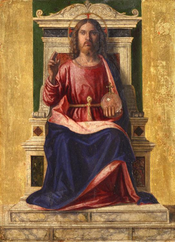This is an old revision of this page, as edited by Mathglot (talk | contribs) at 02:45, 24 March 2014 (Add {{Merge to|One true church}} banner). The present address (URL) is a permanent link to this revision, which may differ significantly from the current revision.
Revision as of 02:45, 24 March 2014 by Mathglot (talk | contribs) (Add {{Merge to|One true church}} banner)(diff) ← Previous revision | Latest revision (diff) | Newer revision → (diff)| It has been suggested that this article be merged into One true church. (Discuss) Proposed since March 2014. |
| This article needs additional citations for verification. Please help improve this article by adding citations to reliable sources. Unsourced material may be challenged and removed. Find sources: "One true faith" – news · newspapers · books · scholar · JSTOR (March 2011) (Learn how and when to remove this message) |
| Part of a series on |
| Salvation in Christianity |
|---|
 |
| General concepts |
| Particular concepts |
| Punishment |
| Reward |
The concept of one true faith, one true religion, or one true church stems from the monotheistic belief in the "one true God", which implies a degree of religious exclusivism. The claim that one faith is true, and that by implication other religions are false, is based upon the claim that God has spoken to mankind through a revelation intended for all, revealing the will of the divinity.
Christianity
Main article: One true churchSome Christian groups or denominations have claimed that they alone represent the one and only church to which Jesus gave his authority in the Great Commission. Other denominations believe that "the church" includes members of many denominations, believing in "an invisible church". A similar theory arose in the 4th and 5th centuries, present in Novatianism and Donatism— both of which were condemned by the mainstream church of their time.
Others believe that in the New Testament period, there were no denominations, and the phrase Christian Church or "the church" refers either to all who follow Jesus, or all who follow Jesus in a particular location.
However, apostolic succession is seen as one of the essential elements in constituting the one true church, ensuring it has inherited the spiritual, ecclesiastical and sacramental authority and responsibility that Jesus gave to the Apostles. A few denominations believe they have restored the original church, in belief or practice. The claim to be the one true church is related to the first of the Four Marks of the Church mentioned in the Nicene Creed: "one, holy, catholic, and apostolic church".
Islam
Muslims believe that Islam is the original and primordial faith, or fitrah, that was revealed by the prophet Muhammad. Muslims maintain that previous messages and revelations have been partially changed or corrupted over time and consider the Quran to be the unaltered and the final revelation from Allah. Religious concepts and practices include the five pillars of Islam, which are basic concepts and obligatory acts of worship, and following Islamic law, which touches on virtually every aspect of life and society, encompassing everything from banking and welfare, to warfare and the environment.
Judaism
Jews believe that the God of Abraham is the one true God. The Jews believe the God of Abraham entered into a covenant with the ancient Israelites, marking them as his Chosen People, giving them a mission to spread the concept of monotheism. Jews do not consider their chosenness to be a mark of superiority to other nations, but a responsibility to be an example of behavior for other nations to emulate.
See also
References
- Accessed July 2013
- Accad (2003): According to Ibn Taymiya, although only some Muslims accept the textual veracity of the entire Bible, most Muslims will grant the veracity of most of it.
- Esposito (2002b), p.17
- Esposito (2002b), pp.111, 112, 118
- "Shari'ah". Encyclopædia Britannica Online.
- "What Does It Mean For Jews to Be the Chosen People?" Pelaia, Ariela.